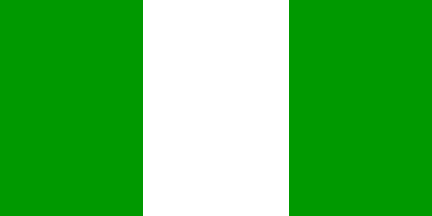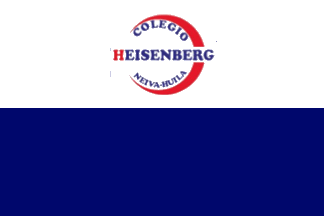 klaus-michael schneider
klaus-michael schneider
Keywords: education |
Links: FOTW homepage | search | disclaimer and copyright | write us | mirrors

FOTW beschäftigt sich mit der Wissenschaft der Vexillologie (Flaggenkunde).
Alle auf dieser Website dargebotenen Abbildungen dienen ausschließlich der Informationsvermittlung im Sinne der Flaggenkunde.
Wir distanziert uns ausdrücklich von allen hierauf dargestellten Symbolen verfassungsfeindlicher Organisationen.
Last modified: 2021-05-22 by  klaus-michael schneider
klaus-michael schneider
Keywords: education |
Links: FOTW homepage |
search |
disclaimer and copyright |
write us |
mirrors
![[Flag of Colombia]](../images/c/co.gif) (2:3)
(2:3)  image by Željko Heimer, 20 May 2001
image by Željko Heimer, 20 May 2001
See also:
 image by Ivan Sache, 11 March 2017
image by Ivan Sache, 11 March 2017
Liceo Hacienda Casablanca was established in 2014 in Madrid, Cundinamarca
Department, by Corporación Educativa Minuto de Dios, a corporation founded in
1958 by Father Rafael García Herreros Unda (1909-1992) , which manages 24
educational institutes all over Colombia.
http://www.colegiosminutodedios.edu.co/liceo-hacienda-casablanca/ -
Institute's website
The flag of the institute is horizontally divided
blue-white-blue (c. 3:8:3) with the institute's emblem in the center. The emblem
is made of a blue disk charged with the golden yellow letters "MD" and a white
cross, borrowed from the the emblem of Corporación Educativa Minuto de Dios. The
disk is surrounded by a white ring inscribed with the institute's name, written
in capital blue letters.
http://www.colegiosminutodedios.edu.co/liceo-hacienda-casablanca/index.php/quienes-somos/nosotros/simbolos
- Institute's website
Photo
http://www.colegiosminutodedios.edu.co/liceo-hacienda-casablanca/index.php/noticias-vive-tu-colegio-sigloxxi/59-participacion-en-los-juegos-inter-colegiados
Ivan Sache,
11 March 2017
 image by Ivan Sache, 13 November 2014
image by Ivan Sache, 13 November 2014
Institucion Educativa Hans Drews Arango was established in Cuba borough, part
of the municipality of Pereira (Risaralda Province) by Decree No. 46 of 12 May
1962.
The institute is named after the local painter and architect Hans Drews Arango
(1929-1961). Professor and Dean of the Faculty of Architecture of Universidad de
Los Andes, he designed several important buildings in Bogotá, Pereira
(Universidad Tecnológica de Pereira), Manizales, Pasto, Medellín, Cartagena and
Cali.
The flag of the institute is horizontally divided green-white-green. Green is a
symbol of unity and hope. White is a symbol of harmony and peace.
Source:
http://inshda.wordpress.com/simbolos-institucinal/ - Institute's website
Ivan Sache, 13 November 2014
 image by Ivan Sache, 21 September 2018
image by Ivan Sache, 21 September 2018
Institution Educative Héctor Rogelio Montoya Bastidas (IEHRMB) was
established in Medellín on 18 March 1973 and formally approved, as a section of
Collegial San Cristobal, by Decree No. 352 enacted on 15 March 1974.
Separated in 1981 from Collegial San Cristobal, the school was renamed to
Concentración Educative Héctor Rogelio Montoya Bastidas by Agreement No. 3,
approved on 2 April 1993, to Collegial Héctor Rogelio Montoya Bastidas in 1997,
and, eventually, to Institution Educative Héctor Rogelio Montoya, by Resolution
No. 16,340 adopted on 27 November 2002.
https://iehrmb.wordpress.com
IEHRMB blog
The flag of IEHRMB is composed of three horizontal stripes of
equal width, from bottom to top, green, white and yellow. The green stripe
represents the mountains, hope and life. The white stripe represents the air's
purity and truth. The yellow stripe represents energy, science and knowledge.
The flag is charged in the center with a six-pointed golden star. Gold
represents the rich values of the community's members. The six points originally
represented the six groups that composed the institute when it separated from
Collegial San Cristobal. It is also a reference to the six, primary and
secondary grades of the institute.
IEHRMB blog
Ivan Sache, 21 September 2018
 image by Ivan Sache, 9 October 2018
image by Ivan Sache, 9 October 2018
Colegio Heisenberg was established on 15 October 1992 in Neiva (Huila) by
Gerardo Silva Dulcey, Ancizar Solano Santos and Francisco Herrera Paramo. The
school is named for the German physicist Werner Heisenberg (1901-1976; awarded
the Nobel Prize in Physics in 1932), one of the founders of quantum mechanics
and the author of the uncertainty principle.
The flag of Colegio
Heisenberg is horizontally divided white-blue with the school's badge in the
white stripe.
https://www.colegioheisenberg.com/simbolos
School website
Ivan Sache, 9 October 2018
 image by Ivan Sache, 12 October 2018
image by Ivan Sache, 12 October 2018
IED Heladia Mejía was originally established in borough La Esperanza de
Chapinero, Barrios Unidos (Bogotá), as Escuela Urbana José María Vergara y
Vergara, to be upgraded in 1959 to Colegio Distrital para Hijas de Educadores,
and in 1972 to Colegio Distrital Heladia Mejía para Hijas de Educadores, a name
shortened in 1983 to Colegio Distrital Heladia Mejía.
Resolution No. 1,69§,
adopted on 4 June 2002, merged Colegio Distrital Heladia Mejía and Centro
Educativo Modelo del Norte to form Institución Educativa Modelo del Norte
Heladia Mejía. The school was soon renamed to Institución Educativa Distrital
Heladia Mejía by Resolution No. 2,849, adopted on 16 September 2002.
The flag of IED Heladia Mejía, according to a photo taken during the "Juegos
Institucionales" 2007, is horizontally divided white-yellow-green with the
school's emblem in the center.
White represents transparency and honesty of
the members of the educational community.
Yellow represents the human
resources that increase the school's ethical, intellectual, technical and
scientific values to the service of the youth.
Green represents hope and
faith, and trust in God's guidance for personal growth.
The triad-shape
coat of arms features the lamp that enlightens science and the virtues
characteristic of the students.
IED Heladia Mejía website
Ivan Sache, 12 October 2018
 image by Ivan Sache, 16 June 2018
image by Ivan Sache, 16 June 2018
Colegio Integrado Helena Santos Rosillo is located in Charalá (Santander
Department).
The flag of Colegio Integrado Helena Santos Rosillo is horizontally divided
yellow-white-green with three yellow stars in the center.
Yellow represents cognitive skills, optimism and enthusiasm.
White represents integral education.
Green represents cooperativism and a spirit of work, creativity, imagination,
and leadership.
The three stars represent the three historical events experienced by the school:
- Foundation, in 1976, as Colegio Cooperativo Integrado, by Father Guillermo
Suarez;
- Officialization, as Colegio Departamental Integrado, by Decree No. 88 adopted
on 19 July 1995;
- Merging with Primaria Helena Santos Rosillo to form Colegio Integrado Helena
Santos Rosillo by Resolution No. 7,028 adopted on 23 August 2001.
Source:
Colegio Integrado Helena Santos Rosillo website
Ivan Sache, 16 June 2018
 image by Ivan Sache, 13 May 2021
image by Ivan Sache, 13 May 2021
Institución Educativa Heraclio Mena Padilla (HEMEPA) originates in
Escuela Pueblo Nuevo, established in borough Pueblo Nuevo, Apartadó
(Antioquia), on a plot offered on 18 August 1064 by Julio Vásquez.
Concentración Educativa de Apartadó Heraclio Mena Padilla was
established by Agreement No. 20 issued on 20 December 1992, to be
renamed to Colegio Heraclio Mena Padilla by Agreement No. 56 issued on
15 May 1999.
The flag of HEMEPA, adopted in 2003, is horizontally divided
white-celestial blue. White represents purity while celestial blue
represents the immensity of the skies.
 image by Ivan Sache, 13 May 2021
image by Ivan Sache, 13 May 2021
 image by Ivan Sache, 01 September 2017
image by Ivan Sache, 01 September 2017
Institución Educativa Municipal Heraldo Romero Sánchez is located in Pasto (Nariño).
The lawyer and writer Heraldo Romero Sánchez (1948-1960) was a leader in the
defense of civic rights in Nariño.
The flag of I.E.M. Heraldo Romero Sánchez is horizontally divided blue-red-gray
with the institute's coat of arms in the center. Blue is a symbol of truth,
harmony, sincerity and felicity. Red is a symbol of energy, virtue, power, force,
passion, valor and boost. Gray is a symbol of stability and balance.
The coat of arms of I.E.M. Heraldo Romero Sánchez features a dove, as a symbol
of peace, a hand, as a symbol of leadership, a gear wheel, as a symbol of
commitment to work, a book, as a symbol of knowledge and perseverance, and
volcano Galeras*, a symbol of greatness and force.
Source:
Institute's Wiki
* Volcano Galeras (4,276 m), a stratovolcano with a large breached caldera
located immediately west of the city of Pasto, is one of Colombia's most
frequently active volcanoes. The dominantly andesitic Galeras volcanic complex
has been active for more than 1 million years, and two major caldera collapse
eruptions took place during the late Pleistocene. Long-term extensive
hydrothermal alteration has affected the volcano. This has contributed to
large-scale edifice collapse that has occurred on at least three occasions,
producing debris avalanches that swept to the west and left a large
horseshoe-shaped caldera inside which the modern cone has been constructed.
Major explosive eruptions since the mid Holocene have produced widespread tephra
deposits and pyroclastic flows that swept all but the southern flanks. A central
cone slightly lower than the caldera rim has been the site of numerous
small-to-moderate historical eruptions since the time of the Spanish
conquistadors.
Source: Volcano World,
Oregon State University
Ivan Sache, 01 Septemeber 2017
 image by Ivan Sache, 14 January 2004
image by Ivan Sache, 14 January 2004
"Colegio Hermanas Misioneras de la Consolata" was
founded on 6 February 1950 in Bogotá by the Consolata
Missionaries.
The Institute of Consolata Missionaries was founded on 29 January
1901 in Turin (Italy) by Blessed Giuseppe Allamano (1851-1926),
who subsequently founded the Congregation of the Consolata
Missionaries in 1910. The congregation settled in
Colombia in 1950. See: <www.ismico.org>.
The flag of the institute, according to photos and the
description available on the institute website,
is horizontally divided blue-white.
Blue is an invitation to transcendence, symbolizing the greatness
and kindness of the blessed Virgin.
White represents the immaculated purity of the Blessed Virgin.
On photos
taken during the Colours ceremony, the flag appears with a very
pale blue shade, similar to the colour of the students' dress and
much lighter than the blue shade of the nearby Colombian national
flag.
Ivan Sache, 14 January 2004
 image by Ivan Sache, 07 September 2014
image by Ivan Sache, 07 September 2014
Institución Educativa Hernán Villa Baena was established in Bello (Antioquia
Department) in 1979. Originally part of Liceo Fernando Vélez, the institute was
quickly relocated in the school of Playa Rica borough. IDEM Playa Rica was
established by Decree No. 97 of 22 February 1981. The institute was renamed IDEM
Hernán Villa Baena on 12 February 1999.
The institute is named for the Bello-born lawyer and judge Hernán Villa Baena
(1912-1994).
The flag of the institute is horizontally divided red-white-blue. Red is a
symbol of enthusiasm and aspiration to surpassing. White is a symbol of the
opportunity to build a future based on individual and collective history. Blue
is a symbol of affect and harmony.
Source:
http://hernanvillabaena.blogspot.fr/ - Institute's blog
Ivan Sache, 07 September 2014
Colegio Distrital Hogar Mariano, located in Barranquilla (Department
of Atlántico), is managed by the congregation of the Daughters of Our
Lady of Mercy. The congregation was founded in the 19th century by the
Italian nun St. María Josefa Rosello (1811-1880).
The flag of Colegio Distrital Hogar Mariano, as shown graphically on
the institute's website, is horizontally divided white-light blue with
the emblem of the institute in the middle.
Light blue represents the Virgin of Mercy.
White represents force and peace.
The emblem of Colegio Distrital Hogar Mariano is made of an open book
placed over a yellow star. The blue writing "ESTUDIO" (left,
"Study") / "CIENCIA" (middle, Science) / "Y LUZ" (right, "and Light")
is placed in the lower half of the emblem. The emblem is surrounded by
a blue ring charged with the white lettering "COLEGIO DISTRITAL HOGAR
MARIANO" (top) / "BARRANQUILLA" (bottom).
On the flag, as evidenced by a photo, the star is blue and the ring
around the emblem is white, with a golden border and lettering.
Source: http://www.colegiodistritalhogarmariano.edu.co/simbolos.html
Ivan Sache, 10 November 2010
 image by Ivan Sache, 6 March 2017
image by Ivan Sache, 6 March 2017
Institución Educativa Horacio Muñoz Suescún originates in Liceo Comercial de
Belén, established in 1979 in nucleus 934 of the Belén Las Mercedes borough,
Medellín, by Decree No. 120. The institute was renamed Liceo Comercial
Departamental Horacio Muñoz Suescún by Resolution No. 1,514, adopted on 26
August 1980. Escuela Urbana República Dominicana was incorporated into the
institute by Resolution No. 506, adopted on 1 February 2000.
Institución Educativa Horacio Muñoz Suescún was established by Resolution No. 16,314,
adopted on 27 November 2001, as the merger of Liceo Comercial Departamental
Horacio Muñoz Suescún and Sección Rural San Pablo.
The institute is named for Horacio Muñoz Suescún, Professor at the Faulty of Medicine of the University of
Antioquia and Representative at the Departmental Assembly.
The flag of the institute is horizontally divided yellow-green. Yellow means reason and sciences, while green means hope.
Source: institute website
Ivan Sache, 6 March 2017
 image by Ivan Sache, 27 June 2014
image by Ivan Sache, 27 June 2014
Colegio Howard Gardner was established on 24 November 2000 in Bogotá by
Miguel Antonio Jiménez Peñaloza. The institute appears to be named for the
developmental psychologist Howard Earl Gardner (b. 1943), Professor at Harvard
University, best known for the theory of multiple intelligences.
The flag of the institute is horizontally divided white-blue. White represents
peace and harmony. Blue represents the sky.
Source:
http://colegiohowardgardner.edu.co/web/colegio/
Ivan Sache, 27 June 2014
 image by Ivan Sache, 12 September 2014
image by Ivan Sache, 12 September 2014
Escuela de Artes y Oficios was established in Palmira (Valle Department) by
Municipal Ordinance No. 13 of 2 June 1947. The institute was subsequently
renamed Institución Educativa Técnica Industrial Humberto Raffo Rivera, as a
tribute to the Representative Humberto Raffo Rivera, who had obtained plot for
the new building of the institute and its official recognition as a "colegio".
Source: http://rafforivera.edu.co/
- Institute's website
The flag of the institute is horizontally divided blue-yellow-white with the
institute's emblem in the middle. Blue is the colour of industry and industrial
safety, as an unbreakable chain of technical production processes. Yellow
is the symbol of the goods and services obtained by the production processes,
with emphasis on the final product and service offered to society. White is the
symbol of academics and teaching of high productive level provided by the
institute, in search for peace, and social interaction, and of service offered
to the region by technical knowledge.
The emblem of the institute was designed in the 1970 in the workshop of
technical industrial design. It has the shape of an individual protection
against war in the Middle Ages. The upper part features an open book, as a
symbol of knowledge, and an arm holding a hammer, as an allusion to force and
work, the base of technical industrial education. The lower part features a cog
wheel, as a symbol of industry, the source of income for the institute's alumni.
The wheel is charged with a pair of compasses, a symbol of precision, a
thunderbolt, and a torch, referring to light and energy, the inextinguishable
sources of industrial spirit.
Source:
http://rafforivera.edu.co/simbolos/ - Institute's website
Photos:
https://plus.google.com/photos/105182725078002665113/albums/5929886443314005249/5929887236075435202?banner=pwa
https://plus.google.com/photos/105182725078002665113/albums/5898287643284098321/5898287694346365090?banner=pwa
Ivan Sache, 12 September 2014
Hosted by: Fanshop-Online.de und Handy-Shop.de
Tipp: Apple iPhone 12 im Shop